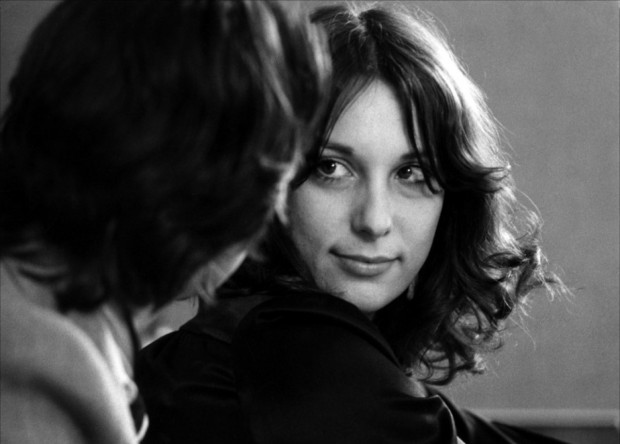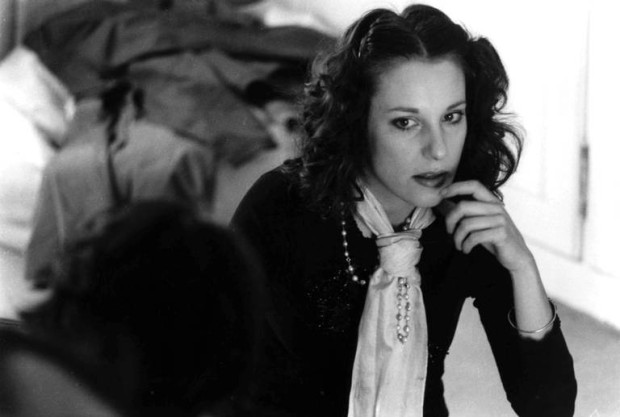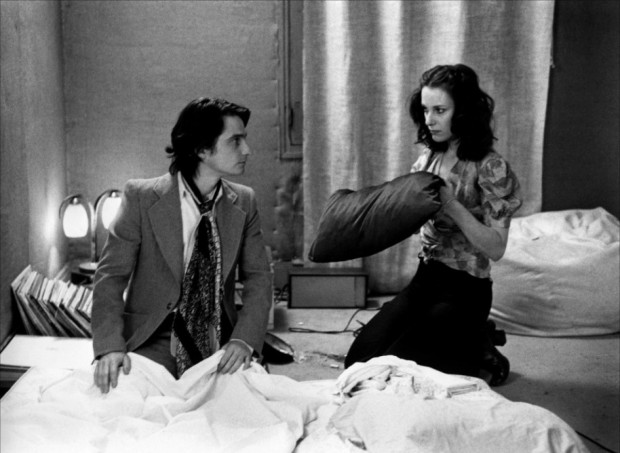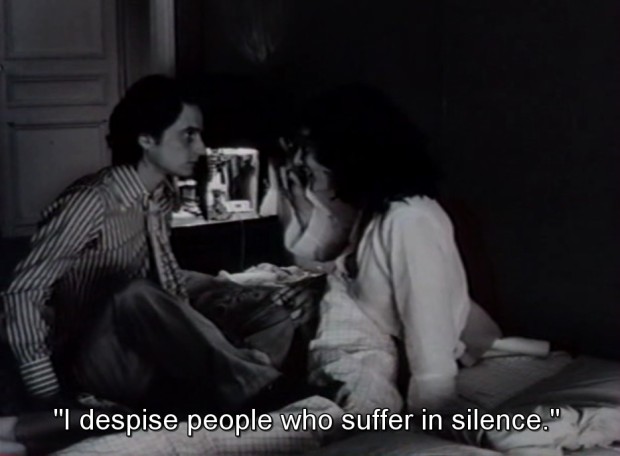An iconographic and text archive related to communication, technology and art.
☛ La Maman et la putain (The Mother and the Whore) by Jean Eustache, France, 1973, 210 mins, @ 01:09:00. IMDb. All the other production stills used in this post are retrieved from The Red List.
Renowned French actress Bernadette Lafont died yesterday, on July 25, 2013:
Bernadette Lafont, who has died aged 74, could have claimed to be the first female star of the Nouvelle Vague. François Truffaut chose the sensual, dark-haired, 18-year-old Lafont and her new husband, Gérard Blain, to play lovers in the director’s first professional film, Les Mistons (The Mischief-Makers, 1957). In this charming short, shot in Nîmes one summer, a group of pubescent boys spy on Lafont and Blain’s lovemaking in the fields. Blain and Lafont were also picked to appear in arguably the first French New Wave feature, Claude Chabrol’s Le Beau Serge (1958). In this film, about a young man returning to his childhood home, Lafont played the “village vamp”. (The Guardian: “Bernadette Lafont obituary” by Ronald Bergan, July 26, 2013)
I’ve had the chance of viewing a very nice 35mm copy of Les Mistons three years ago, during a Truffaut retrospective. In the opening of what is considered to be Truffaut’s first significant film, Bernadette Lafont plays a young woman, “unbearably beautiful”, who is riding her bicycle through a small rural town. She is dressed in a white blouse and her dark skirt is flying in the wind. As the voice over recounts, she haunts the “darkly hidden dreams” of young teenagers.
But I did not discover Bernadette Lafont in Les Mistons. I first came to know the French actress years ago through her unforgettable role in Jean Eustache’s masterpiece La Maman et la putain, which I have seen a couple of times since then. The film stands less for the excitement of May 1968 than it does for all the unfulfilled promises and unrealized hopes that came to mark the years that followed. If 68 was about overcoming authoritarian capitalism, the film shows how human beings are perfectly capable of alienating themselves without the help of an oppressive regime. The couple, through mutual and seemingly never-ending incomprehension, provide the stage for such a demonstration.

In the film, Lafont plays Marie, the owner of a fashion boutique who is having an enduring liaison with the young Alexandre, played by Jean-Pierre Léaud. Alexandre, whose head is filled with quotations from books and movies, is unemployed, has no money, and mostly lives with her. That doesn’t stop him from trying to start a relationship with another woman, Veronika (played by Françoise Lebrun). Imbroglios ensued in the form of colorful tirades, amidst cigarette smoke and drinking scene.
Eustache was very strict regarding the script: the actors were to read the lines as they were written, and there isn’t much in the filmed version that is improvised. In an interview she did in 2007 with Jean-Baptiste Morain et Serge Kaganski for the French cultural magazine Les Inrockuptibles, Bernadette Lafont recalled:
Avec Léaud, vous avez ensuite fait La Maman et la Putain. Là, vous aviez un texte !
Là, oui ! On n’improvisait pas du tout. Le tournage était tendu mais, des acteurs aux techniciens, tout le monde savait qu’on faisait quelque chose d’extraordinaire. On avait lu le scénario avant, c’était splendide. Eustache était tellement à vif, tellement concentré. Il fallait jouer très serré. Un jour, Léaud avait voulu faire une petite blague. Véronica dit à un moment dans le film : “Et vous, avec votre vieille queue en forme de bec de théière.” Et Léaud a eu le malheur de dire : “Ah oui, Lautrec disait : “Quand je bande, je ressemble à une cafetière.” Eustache l’a mal pris : “Puisque vous ne prenez pas mon film au sérieux, je m’en vais, je m’en vais !!!” Et il a quitté le plateau, alors que le budget était très minuté. Il n’était pas cool du tout. (Les Inrockuptibles: “Bernadette Lafont : « Tout le monde peut faire du cinéma »” by Jean-Baptiste Morain et Serge Kaganski, July 25, 2013)

Despite the dialogues being written and filled with literary and cinematic references, they do not come as theatrical, quite the contrary. Instead, the film provides an almost documentary-like portrait of a number of frail, but intense relationships. Furthermore, the final result is far from being pathetic, for the film is loaded with snappy retorts, humorous one-liners and comical ―although sometimes awkwardly realistic― situations.
The film won the Jury’s Special Grand Prix at Cannes, in 1973. As of now, the only version with English subtitles is still the VHS edition (Amazon). For a while, a subtitled version was available on YouTube, but it is no longer the case at the time of writing (although a version without subtitles can be found). A Page on Facebook is appropriately named We Want the Jean Eustache Film Edition. It offers some interesting Eustache-related materials.
There are many more images of Bernadette Lafont taken from the movies she played in over at The Red List. For a more detailed explanation of the relationship betwen Eustache’s film and the French New Wave, see Brannavan Gnanalingham’s essay “Milestone Movies: The Mother and the Whore (1973)”.

Previously: “Portrait de Jean Eustache” by Alix Cléo Roubaud, 1981
- By Philippe Theophanidis
- on
- ― Published in Art, Movies
- Tagged: actress, Bernadette Lafont, Jean Eustache, new wave, obituary

